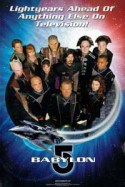 Babylon 5 was ahead of its times, in both good ways and bad.
Babylon 5 was ahead of its times, in both good ways and bad.
*** SPOILER ALERT: DO NOT READ UNTIL YOU HAVE FINISHED WATCHING Babylon 5 ***
I stated in my review of Season 5 that Babylon 5 is about plot, not characters. That’s only partly true. The show does have some truly outstanding character arcs. I consider Ambassadors Londo Mollari and G’Kar two of the richest characters in the history of television. The writing for both characters consistently excells, but the performances of Andreas Katsulas and Peter Jurasik truly sell the characters.
J. Michael Stracynski plays on audiences’ expectations and stereotypes with these two. Initially, G’Kar, a reptilian alien complete with beady red eyes, appears to be an antagonist who tries to foil Commander Sheridan’s plans. Meanwhile, Londo comes across as the fun-loving human with a silly hairdo. Yet, as G’Kar tells Catherine Sakai in “Signs and Portents,” all is not as it seems. Londo soon makes a Faustian pact with the Shadows, while G’Kar struggles to save his downtrodden people. However, even at this point, the show resists simply turning Londo into the villain. Londo is ambitious and at times cruel, but he also doesn’t understand the consequences of his decisions until it’s too late. By the end of the series, I’m tempted to say that he suffers far more than G’Kar.
With a few exceptions (i.e., Michael Garibaldi and Marcus), I liked most of the other main characters, but never fell in love with them. There are some exceptional character moments in Babylon 5. Susan Ivonova’s reaction to Marcus’ death made me wish that Claudia Christiansen had stayed on through Season 5 (and almost made me forgive Marcus for his annoying comments). But I always felt something was missing, as if the acting or writing never fully gelled. As noted in my previous “Retrospective,” even though Babylon 5 is about an epic war, the show is emotionally subdued. I rarely felt that these were people under enormous strain, certainly nothing like the drama on Battlestar Galactica as the Colonials fled the Cylons.
I was also disappointed in the quality of the villains (not counting Londo or Byron, neither of whom I’d consider true villains). The Shadows hide behind some vague Social Darwinism but never really become characters so much as symbolic threats. The representatives of President Clark’s regime, including the Night Watch and Psy-Corps, were all goose-stepping goons. I never got the sense that President Clark believed himself to be the hero of his own story. The black armbands, propaganda posters, and militaristic outfits all recalled Nazi Germany and other real-world totalitarian regimes, making it difficult to view Clark and the Psy-Corps as anything but evil.
I can’t help but compare these villains to those on Star Trek: Deep Space Nine. On DS9, I never doubted that Gul Dukat and Weyoun saw themselves as the heroes against the arrogant Federation. The characters – and the actors – had a charisma or charm that made it impossible to hate them. Even the “good guys,” the DS9 station crew, at times found themselves sympathetic to Dukat. I couldn’t wait to watch those two in action – an important factor for a television show. By contrast, I couldn’t wait for somebody on Babylon 5 to throw Bester out an airlock.
The secondary characters don’t receive as much screen time, but are crucial to making the show work. Ambassadorial aides Vir Coto and Lennier serve as effective dialogue partners for Londo and Delenn, respectively. Both men have their own personal journeys, often struggling to reconcile their inner darkness with their ideals. Whereas Londo embraces almost any means to achieve his ends, Vir shuns violence to advance even just goals. For Lennier, he must wear a mask to hide his emotions for Delenn, who is one of the most open and honest characters in the show. During the first season, the Narn aide, N’Toth, also worked well as a sarcastic foil to G’Kar. Unfortunately, the character disappeared in Season 2 and G’Kar never received a permanent replacement.
Dr. Stephen Franklin is in many ways the prototypical Babylon 5 character. He’s a workaholic and generally has a subdued personality. However, Franklin (portrayed by Richard Biggs) does get to exhibit a wider range of emotions than the rest of the crew. I think this is partly a result of his function on the station. As a doctor, he’s in a position to see the horrors of war on a much more immediate and intimate level. And, ultimately, he can’t handle it. At several points, he fails professionally (e.g., “Believers” and “Confessions and Lamentations”) and personally (his Stim addiction). There’s something refreshing in following a character who has such human successes and failures. For all of my complaints about the human characters on Babylon 5, I always felt like I was watching real people.
My journey through Babylon 5 concludes next week with Part 3 of my Retrospective, about the legacy of Babylon 5…
